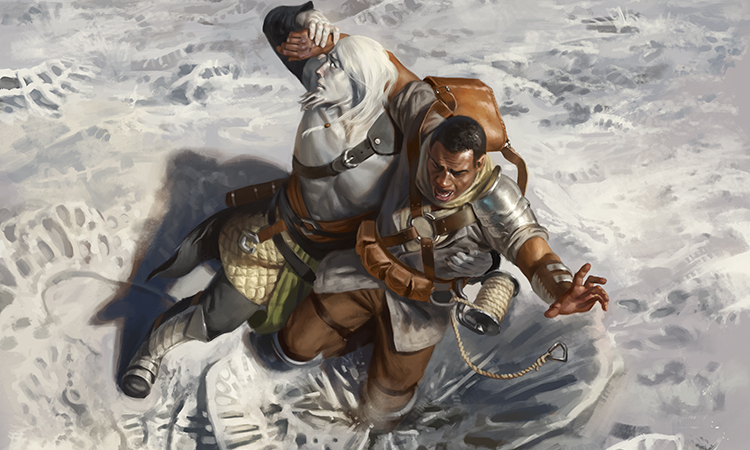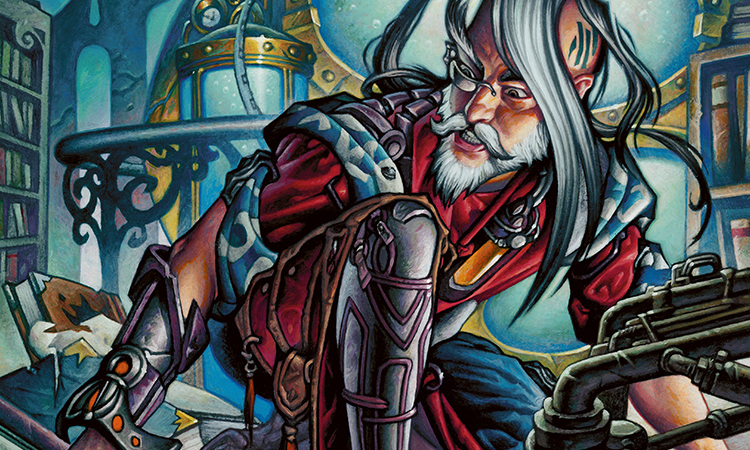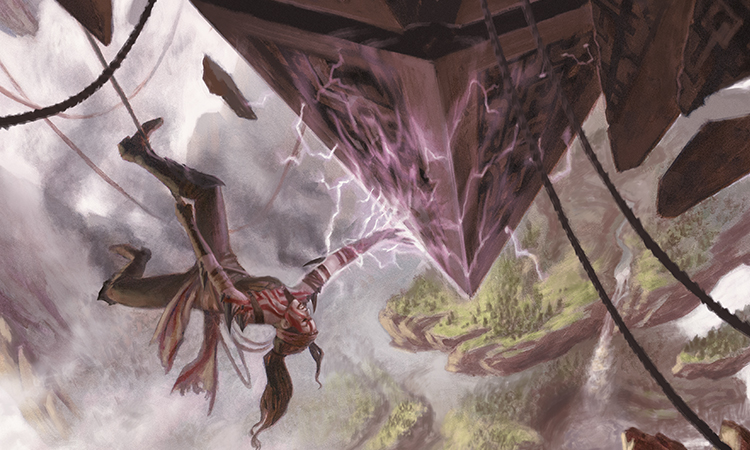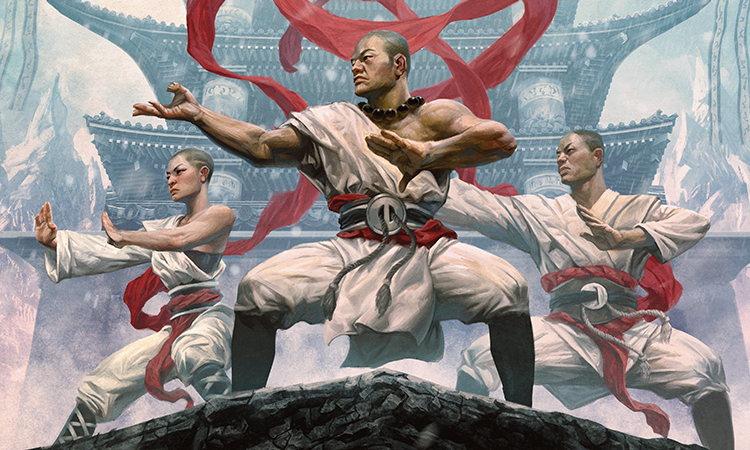Becoming a Better Player
This will be the final article that I write for Level One. For the time being, the column will be going on hiatus. Over fourteen months, I've tried my best to build a complete, self-contained course that offers the tools one needs to become a competitive Magic tournament player. If you've enjoyed any of my articles, please direct intrepid new players toward them, or keep them in mind for any time you might be looking for a refresher course. Next week, look for a column that packages all of my columns into a single course.
But I still have one very important job left to do. Before we part ways, it's my duty to prepare you for "Level Two." For better or for worse, a complete, step-by-step manual for becoming a truly world-class Magic player may never exist. Instead, if your goals extend beyond the scope of Level One, the ball is going to be in your court. Let me tell you everything I know about becoming a better player.
Part I: Process
Practice Makes Perfect
If your goal is to improve at Magic, the best thing to do, by far, is play a lot of Magic. The most dominant winning streaks in the game's history have been put together by players who were simply eating, sleeping, and breathing Magic. When you're playing a lot, you see winning lines of play more easily, you make fewer mistakes, and you understand what's going on in the games on a deeper level.
Furthermore, if you're not "in shape"—if the fundamentals aren't coming quickly and effortlessly for you—then it's going to be that much more difficult to improve at the more challenging facets of the game.
All that said, it's not just about putting in the hours, and having a full-time job or other commitments does not preclude you from being a world-class player. More important than the number of hours you play is how much you're actually taking away from those hours. Quality over quantity!
Deep focus on a single game of Magic, from start to finish, is a world apart from playing while you're distracted. Is the TV on in the background? Are you multi-queuing on Magic Online? Are you playing while you're frustrated, tired, or otherwise not in your best frame of mind? Not only is this type of playing an inefficient use of time, but if you do it too often, it can also train you into bad habits.

Adverse Conditions | Art by Jason Rainville
Asking Why
The best way I know to get the most out of your time playing Magic is a method that I call asking why. When you finish a game, you should reflect on it, and ask yourself why the winning player won.
The exercise is more challenging than it sounds, particularly when you've just lost a game. It requires patience, honesty, and a level head. Asking why is about taking responsibility for your own decisions.
First, look for technical mistakes or judgment calls you made that could've led to the loss. Did you miss a potential point of damage early in the game that might've changed things?
Second, look for elements of the mental game that might've helped you turn a loss into a win. If you'd known that your opponent had a permission spell, could you have successfully played around it? Were there any hints that you could've picked up on to help you learn what was in your opponent's hand?
Third, consider how you could've put yourself in a different position via sideboarding or deckbuilding. Did you get mana flooded? If so, was it a fluke, or did your post-sideboard configuration lack late-game staying power?
Fourth, ask if you're playing the right deck. Have you lost enough games in this same way that you've revealed a fatal flaw in your deck?
Finally, after you've exhausted all other options, ask if it was simply bad luck. Many times, your losses will largely be due to bad luck. However, be careful not to hide behind that excuse. Look to it only after you've left no stone unturned with regard to the aspects of the game that you did have control over.
Research
Improving at Magic is going to be a largely internal process. However, trying to figure out everything by yourself will be difficult. Sometimes, you won't realize if you have a misconception that's causing you to persistently make the same mistake. Incorporating outside ideas into your study will help prevent this, and will accelerate your learning.
Thankfully, plenty of food is out there for a hungry mind to feast on! Check out the new decklists and tournament coverage that appear every single weekend. Read strategy articles from any of the dozens of websites out there. Study videos of the masters facing off at the Pro Tour or World Championship. Each week, more Magic strategy content comes out than one individual could possibly keep up with, and that's not even to mention the twenty years of backlogged information that you can still find on the internet! There's no reason to ever feel stuck.
Just remember that research should be supplementing your own practice, not replacing it. Use the resources at your fingertips to take in new ideas, and then incorporate them into your own gameplay, in your own way.

Compulsive Research | Art by Michael Sutfin
Other Players
The most valuable resources available to you are other players. There's no faster way to grow than to put yourself out there and be ready to learn from others. Listen to them, ask questions of them, watch them play, and play against them!
You'll learn fastest by playing against players who are better or more experienced than you. However, there's plenty to learn from everyone, even players who might not have enjoyed as much Magic success as you have. Everyone has had different experiences and cultivated different opinions. Listen to what people have to say, put it through the filter of your own mind, and figure out how you can use it to improve.
Part II: Attitude
Mastering Luck
The concept of luck is challenging, but a proper understanding of it is essential for any serious Magic player. Blaming bad luck can make you blind to mistakes you might be making. Worse yet, it can make you complacent, and can diminish your desire to win and to improve.
That said, many of the losses you will take in Magic will be the result of bad luck. Sometimes you will get a hand with no lands and be forced to mulligan. Sometimes you will get paired against your worst matchup in the crucial round of the tournament. Sometimes the cards will simply come in an order that leads to you losing. There are many uncertain elements in Magic, and not everything is in your hands.
Blaming bad luck all the time is unhealthy, but the opposite is dangerous as well. Losing a game cannot be the end of the world for you. You cannot beat yourself up, scrap your deck idea, or quit Magic every time you mulligan down to five!
Instead, you need to find a healthy balance by mastering luck. You must not hide behind luck and let it excuse your own less-than-perfect decisions. However, you should also understand and accept that not everything is under your control.
When You're Losing
One trait that many of the best players I know have in common is that they take losses very hard. Great players tend to take responsibility for their own mistakes and misjudgments, and blame themselves for a high portion of the games that they lose. (This probably has something to do with how they became great in the first place.) Moreover, it's painful to put everything you have into something and come up short. Unfortunately, it's a common experience in Magic, since only one player can be the winner of any given tournament.

Painful Truths | Art by Winona Nelson
It's okay to feel disappointed when you lose. It's a sign that you care! The key, though, is to be disappointed, and then to move on! Dwelling too long on a loss will make you miserable and stunt your growth. You can't accomplish anything when you're down in the dumps, and your gameplay will suffer if you allow yourself to become frustrated easily.
The best thing to do is honestly reflect on the loss—not with the goal of making yourself feel bad, but with an eye toward avoiding the same problem in the future. Go back over the game, using the asking why method. Remember, if you can honestly attribute your loss purely to bad luck, that's okay, too! Just make sure that you're turning to that conclusion only as a last resort.
When You're Winning
If you're winning a lot at Magic, you're probably getting lucky. It's a strange idea to stomach, but it absolutely doesn't take away from anyone's accomplishments. Tournament Magic is about putting yourself in the best possible position to take advantage of good luck, should it come to you. It's only when you prepare a lot, you play well, and the cards come your way that you'll be successful.
The point is, don't assume that you're not making mistakes just because you're winning. The vast majority of mistakes do not swing the outcome of the game. However, if you allow that fact to make you complacent, then how will you ever prevent the mistakes that do turn out to be game-losing?
There's always more to learn, even when you feel like you're on top of the game. Magic is a game with highs and lows. When you are on a high swing, keep working at improving. Your highs will last longer, and your lows won't swing as low.
A Healthy State of Mind
A healthy state of mind is the crux of a successful Magic career.
You must have the confidence to trust yourself, and believe that victory is possible. If you don't believe, deep down, that you can win, then you won't search your hardest for those subtle plays that define a great player.
You must have the humility to see how much you have yet to learn. If you become overconfident and disdainful toward other players, you'll destroy the most valuable resources for your own growth.

Ojutai Exemplars | Art by Willian Murai
You must strive for perfection. Even though perfection may not be possible, you should still reach for it! Some of the topics I've covered in Level One may have seemed nitpicky at the time. However, these are the skills you need to cultivate in order to become an elite player. "Good enough" should never really be good enough.
You must have the dedication and strength of will to get through the hard times. If you enter Magic tournaments, you're going to lose, and you're going to lose a lot. If you allow yourself to give up when things aren't going your way, then you'll have no chance of ever achieving your goals.
Finally, you must love the game. If traveling to tournaments, firing up Magic Online, or spending your lunch break studying a strategy website are not truly joyous things for you, then becoming a great player is going to be impossible.
Life is a long road, and your dedication to Magic will inevitably wax and wane, and that's okay! If you're starting to burn out, or if other aspects of life come calling, then it's good to re-evaluate your approach to Magic, at least temporarily. The worst thing you can do is force yourself to keep playing until the game you once loved becomes a chore.
Farewell
I've enjoyed my time writing Level One, and will miss it now that it's over. I feel incredibly thankful for the opportunity to helm the column over this past year. I've been playing Magic for the bulk of my life, and offering what I've learned over the years to a new generation of players means a lot to me. Thanks for reading!
Level One covered everything you need to know in order to become a rock-solid, winning tournament player. It even touched on a few advanced concepts that more serious players might love to sink their teeth into. With this final article, I hope that I've given you the tools you need to continue your study, for as long and as far as competitive Magic can hold your interest. If the game can offer you any fraction of the joy it's given me over the years, then your time will be well spent.
With that, I leave the rest to you.

